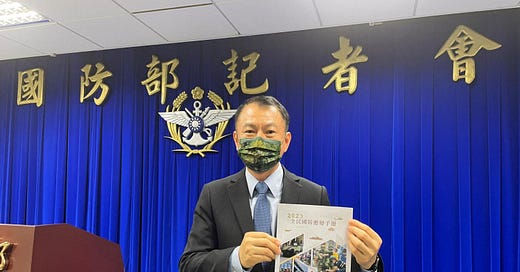Taiwan's whole of society resilience, the Trump Administration's tilt towards Asia, and the most difficult choice the President could have to make
Is the pivot to Asia actually going to happen?
Dear Friends and Colleagues,
Below are three publications I wrote this fall and spring about an emerging and novel element of Taiwan’s defense, speculation about the Trump Administration’s potential pivot to Asia, and one of the thorniest decision points a US president would ever face.
Taiwan President Lai Ching-te is seeking to bolster Taiwan’s defense by promoting a whole-of-society resilience campaign. It underscores Taiwan's commitment to its own defense and presents opportunities for expanded cooperation with the United States.
The Trump Administration has been in office just under two months but has started off with a sense of urgency and focus. Deducing trends and making predictions is challenging, partly by design as President Trump keeps his cards close to his chest while he sets his appointees loose to tear up tradition and convention. The dramatic delivery last month of a clear message to Europe that the US will no longer underwrite their security raises the prospect that the new Administration could be able to actually turn their backs to the Middle East and Europe to concentrate on strategic competition with China - accomplishing the pivot to Asia.
Lastly, should deterrence fail and Beijing decides to use military force against Taiwan, how would we identify the transition point from grey zone military coercion to a state of war? Identifying that critical juncture, quickly, is essential for the US to mount a successful military response. Unfortunately, it is not so clear cut and ultimately a subjective decision when “zero day” is actually upon us.
Enjoy the following pieces, feel free to comment to provide your opinions and feedback, and of course feel free to share this post and the articles with your friends and colleagues.
Whole-of-society resilience: A new deterrence concept in Taipei
The whole-of-society resilience campaign is a substantial part of Taiwan’s overall approach to defense and deterrence. By changing the Taiwanese people’s perceptions of China’s military threat and realizing their own agency to address it, Lai is seeking to empower the Taiwanese people. He plans to counter military coercion by galvanizing society to cooperate with the military and government to increase Taiwan’s will to resist coercion. Taiwan’s commitment to developing resilience throughout society presents significant opportunities to expand U.S.-Taiwan cooperation to enhance Taiwan’s deterrence and increase cross-Strait stability.
https://www.brookings.edu/articles/whole-of-society-resilience-a-new-deterrence-concept-in-taipei/
Is the Pivot to Asia Finally Happening?
The Obama Administration pledged to pivot to Asia but was unwilling to pay the political costs of prioritization, choosing to rebalance instead. As the Trump Administration turns its back on Europe, does this mean the pivot is finally going to happen?
Asianists in key positions within the Administration will compete for Trump’s approval to prioritize competition with China. Libertarians with designs to reduce American security entanglements globally, not just in Europe and the Middle East will resist calls to double down on deterring China and defending Taiwan.
President Trump has not backed either school of thought, however. He is not ideologically driven. He keeps his own counsel, keeps his cards close to his chest, and revels in his own unpredictability and the leverage it gives him when negotiating with foreign counterparts, and perhaps his own advisors as well.
https://www.jstribune.com/thompson-is-the-pivot-to-asia-finally-happening/
What the US Needs to Understand to Prevail in a Conflict over Taiwan
China is steadily increasing coercive measures against Taiwan, but they remain below the threshold of military conflict. What is the point at which China’s military coercion transitions to the use-of-military force consistent with war? Essentially, when does coercion end and conflict begin? Making that determination will be critical to US responses. Enhancing understanding of that transition will speed decision-making and increase the probability that the US and Taiwan would prevail in a conflict across the Taiwan Strait.
https://jstribune.com/thompson-what-the-us-needs-to-understand-to-prevail-in-a-conflict-over-taiwan/
If you no longer want to receive this mailing you can unsubscribe below.




But are the Taiwanese people finally ready to man their military?